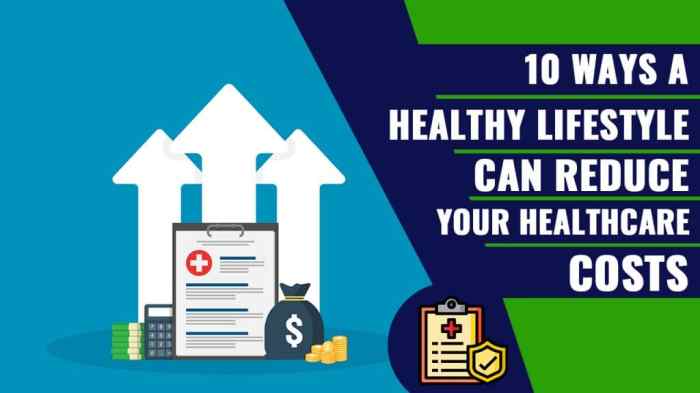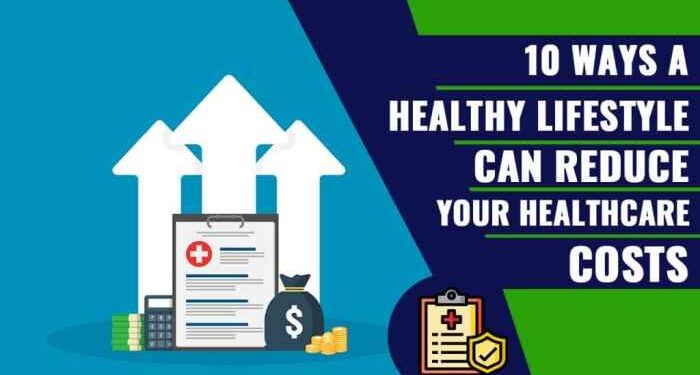Embark on a journey exploring the intersection of healthy living habits and reduced insurance costs. Discover how simple lifestyle changes can lead to financial savings and improved well-being.
Benefits of Healthy Living Habits
Adopting healthy living habits can have a significant positive impact on overall well-being. Not only do these habits improve physical health, but they also contribute to mental and emotional well-being. By making small changes to daily routines, individuals can experience a range of benefits that enhance their quality of life.
Examples of Healthy Living Habits
- Eating a balanced diet rich in fruits, vegetables, whole grains, and lean proteins.
- Engaging in regular physical activity such as walking, jogging, or yoga.
- Getting an adequate amount of sleep each night to support overall health and cognitive function.
- Managing stress through relaxation techniques, mindfulness, or hobbies.
- Limiting alcohol consumption and avoiding tobacco products to reduce the risk of chronic diseases.
Long-Term Benefits of Maintaining Healthy Habits
- Reduced risk of developing chronic conditions like heart disease, diabetes, and obesity.
- Increased energy levels and improved mood due to regular exercise and proper nutrition.
- Enhanced immune function, leading to fewer illnesses and quicker recovery times.
- Improved cognitive function and reduced risk of cognitive decline with age.
- Overall increased longevity and better quality of life in the long run.
Healthy Diet Choices

Eating a balanced and nutritious diet is essential for maintaining good health and reducing the risk of various diseases. By making healthy food choices, you can also potentially lower your insurance costs and premiums.
List of Foods for a Healthy Diet
- Fruits and vegetables: Rich in vitamins, minerals, and antioxidants.
- Whole grains: Provide fiber, essential nutrients, and energy.
- Lean proteins: Include poultry, fish, beans, and nuts for muscle health.
- Dairy or dairy alternatives: For calcium, vitamin D, and bone health.
- Healthy fats: Include sources like avocados, nuts, and olive oil in moderation.
Benefits of a Balanced Diet for Lower Insurance Costs
Eating a balanced diet can lead to overall better health, reducing the risk of chronic conditions such as heart disease, diabetes, and obesity. This can result in fewer medical visits, lower healthcare costs, and ultimately, lower insurance premiums
Correlation Between Diet-Related Health Issues and Insurance Premiums
Individuals with poor dietary habits are more likely to develop health issues like high cholesterol, hypertension, and type 2 diabetes. Insurers may charge higher premiums for individuals with these conditions due to the increased risk of claims related to these diet-related diseases.
Regular Exercise and Physical Activity
Regular exercise plays a crucial role in maintaining good health and overall well-being. It not only helps in managing weight but also reduces the risk of chronic diseases and improves mental health.
Types of Physical Activities
- Cardiovascular exercises such as running, walking, cycling, or swimming help in improving heart health and increasing stamina.
- Strength training with weights or resistance bands can build muscle mass, increase metabolism, and enhance bone density.
- Flexibility exercises like yoga or Pilates improve range of motion, reduce the risk of injuries, and promote relaxation.
Regular physical activity can significantly reduce the risk of chronic illnesses such as heart disease, diabetes, obesity, and certain types of cancer. By incorporating different types of exercises into your daily routine, you can boost your immune system, enhance your mood, and increase your energy levels.
This healthier lifestyle can lead to lower insurance costs as the risk of expensive medical treatments decreases with improved health outcomes.
Stress Management Techniques
Stress can have a significant impact on our overall health, affecting both our physical and mental well-being. In addition, stress can also play a role in determining insurance costs, as chronic stress has been linked to various health conditions that may increase the risk of insurance claims.
By incorporating effective stress management techniques into our daily routine, we can not only improve our health but also potentially reduce insurance costs.
Mindfulness Meditation
- Practicing mindfulness meditation can help reduce stress levels by focusing on the present moment and promoting relaxation.
- Regular meditation has been shown to lower cortisol levels, the stress hormone, and improve overall well-being.
- Insurance companies may offer discounts for individuals who engage in stress-reducing activities like meditation, as it can lead to better health outcomes.
Physical Exercise
- Engaging in regular physical exercise can be an effective way to manage stress and improve mood.
- Exercise releases endorphins, also known as "feel-good" hormones, which can help combat stress and anxiety.
- Individuals who exercise regularly may be viewed more favorably by insurance companies, potentially leading to lower premiums due to the positive impact on health.
Summary
In conclusion, embracing healthy living habits not only benefits your health but also your wallet. By making small changes in your daily routine, you can pave the way for a healthier future while cutting down on insurance expenses.
Q&A
What are some examples of healthy living habits that can lower insurance costs?
Examples include regular exercise, maintaining a balanced diet, and effective stress management techniques.
How does a healthy diet impact insurance costs?
A healthy diet can reduce the risk of chronic illnesses, leading to lower insurance premiums.
What types of physical activities can help in reducing insurance costs?
Activities like walking, swimming, and yoga can contribute to better overall health and potentially lower insurance expenses.
Why is stress management important for reducing insurance costs?
Stress management techniques can improve overall health, lowering the likelihood of health issues that could increase insurance premiums.



